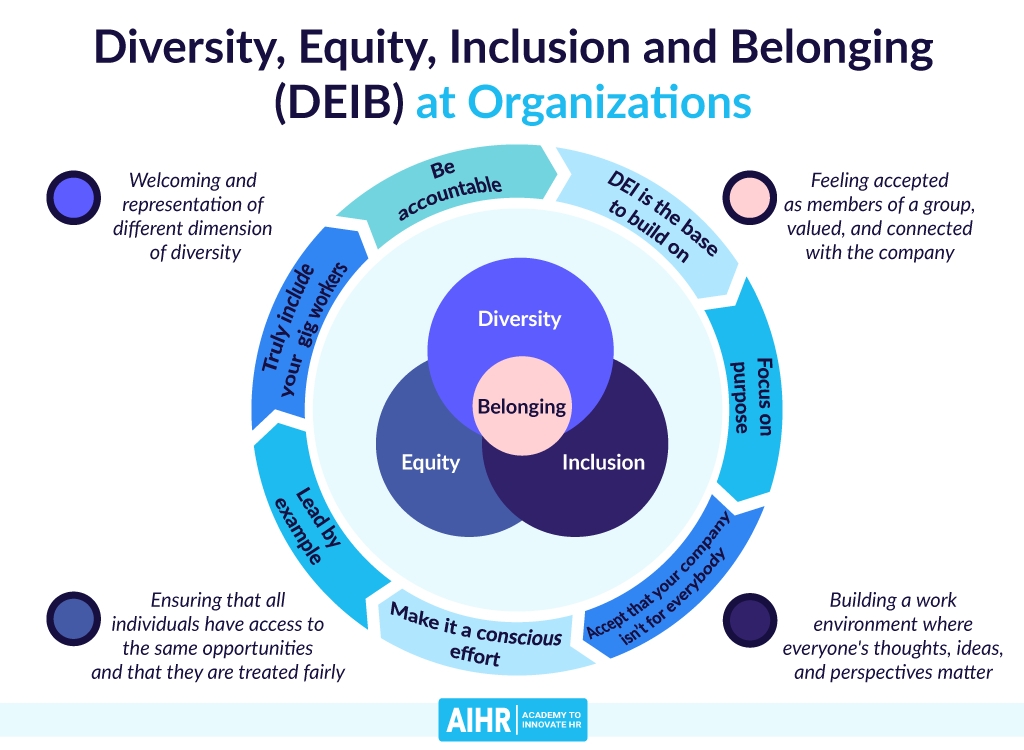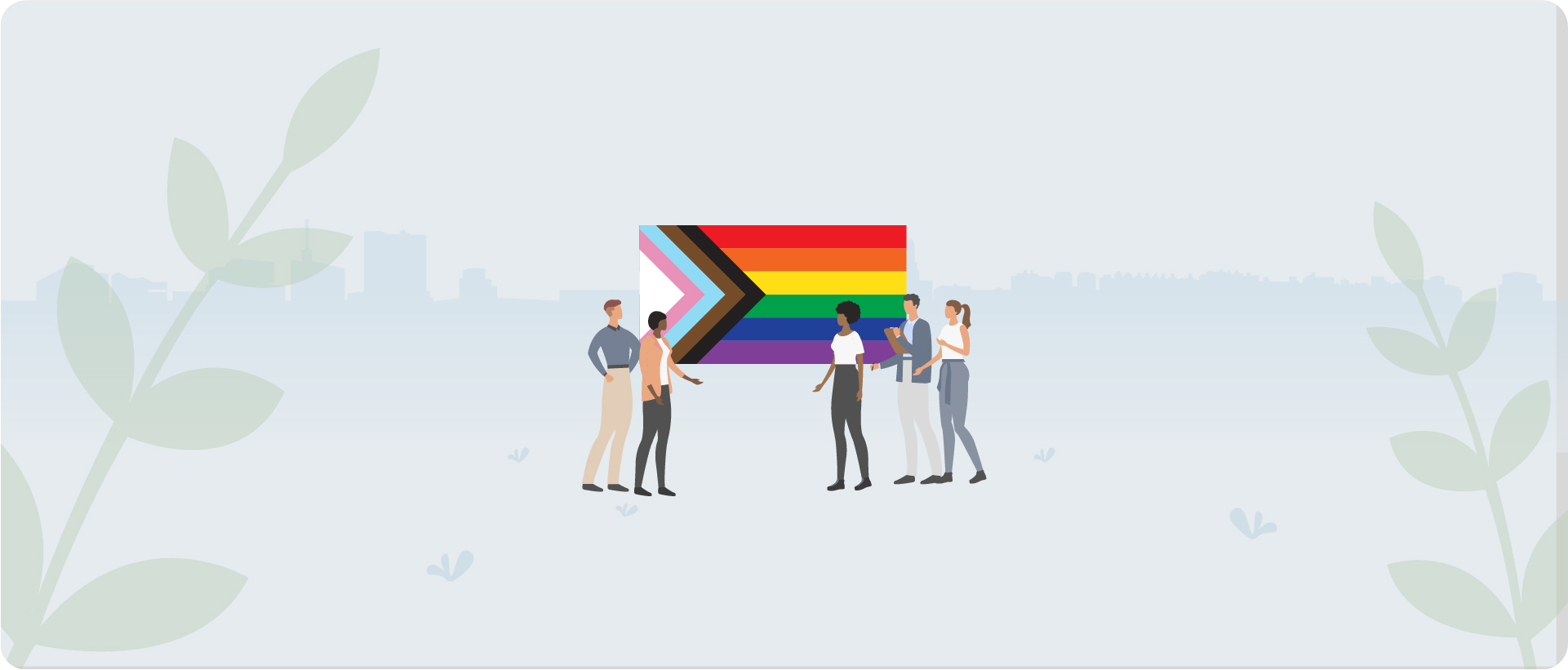Happy Pride Month!
As part of celebrating Pride Month this June, we’re sharing 12 tips for how to foster a more diverse and inclusive workplace for the LGBTQ community.
What Is DEIB?
What is diversity? Diversity in the workplace is the representation of different characteristics that employees can have. These unique characteristics can include sex, race, sexual orientation, gender identity, and ability.
What is equity? Equity at work is all employees at all levels being treated in an impartial, or fair, manner. This fair treatment includes pay and total compensation packages, opportunities for development and career growth, and accommodations for folks of varying abilities.
What is inclusion? Inclusion in a workplace setting is having an environment where all employees feel valued, supported, and welcomed for who they are.
What is belonging? Belonging is the feeling that employees have when they feel accepted for who they authentically are. In a way, belonging is the result of employers fostering diversity, equity, and inclusion in the workplace.
To build on a metaphor from diversity and inclusion consultant Vernā Myers:
- Diversity is being invited to a party,
- Equity is everyone being offered the same snacks,
- Inclusion is being asked to dance, and
- Belonging is guests saying, “Thanks for welcoming me!”

Why is DEIB for LGBTQ employees important?
While reports from McKinsey and others confirm the business case for workforce diversity, LGBTQ employees still face significant challenges at work. For instance, a 2023 study from the Center for American Progress found that half of LGBTQ adults have faced workplace discrimination or harassment in the past year. Without the accepting workplace environment required to fulfill their purpose, more than 1 out of 3 LGBTQ workers have quit a job due to employer treatment of their sexual orientation or gender identity.
Of course, there’s also the employee experience to consider. According to Bonnie Willi, Harver’s Employee Experience Manager: “It is critical to give voice to underrepresented groups at any company. By fostering DEIB, you give LGBTQ employees an opportunity to build community, enact necessary changes, and bring attention to the causes we should be caring about.”
Want to help your organization improve DEIB for LGBTQ employees and candidates? Make good use of the following 12 tips and the resources linked at the end of this post.
- White paper
Before you continue!
Supporting DEIB for LGBTQ employees? Get your free whitepaper on why and how to enable hiring and talent management fairness.
3 tips to improve LGBTQ workforce diversity
- Expand your recruitment sources to include LGBTQ job boards like the LGBTQ+ Career Network and career fairs. After all, the less diverse your candidate pools are to start, the harder it becomes to hire a diverse group of employees.
- Adopt a skills-based hiring approach and use inclusive language in job descriptions to minimize LGBTQ drop-off at early stages of the candidate journey. For instance, one of Harver’s customers, a global consumer packaged goods company, uses an AI solution to optimize job description language for inclusion.
- Add rigor for fairness in hiring, such as using validated assessments for objective decision support, standardizing interviews, and providing fair interviewing training for all hiring managers and recruiters. Remember, workforce diversity is dependent on the fairness of your hiring strategies and processes.
3 tips to treat LGBTQ employees equitably
- Ensure wage parity at all levels. According to HRC Foundation research, LGBTQ workers earn about 90 cents for every dollar the typical worker earns. This wage gap is also impacted by intersectionality, with white LGBTQ workers earning 97 cents compared to significantly less for Latin, Black, and Native American LGBTQ workers.
- Enable fairer internal mobility and development opportunities by assessing skills and disposition instead of pedigree. Hiring for and developing skills in an equitable manner also supports greater employee engagement and productivity.
- Audit your hiring journey and other aspects, like promotion rates and pay gaps, for fairness. Make sure to benchmark against external best practices, as outside-in perspective is critical for improving DEIB.
3 tips for being inclusive of LGBTQ employees
- Establish a group for LGBTQ employees and allies. As an example, Harver’s Employee Experience Manager Bonnie Willi helped launch a Pride Employee Affinity Group (EAG) that hosts regular meetings and stays connected in a Slack channel. You can check out Pride EAG member showcases throughout June by following Harver on LinkedIn.
- Celebrate diverse occasions, such as hosting a Pride event at work. You can also help educate and engage employees by raising awareness of LGBTQ history and culture in other ways. For instance, add LGBTQ educational material to your learning platform.
- Create inclusive benefits that understand and meet the specific needs of LGBTQ employees, which can include nuances in medical coverage, flexible work schedules, and more. With an increased focus on employee well-being the past few years, keep in mind that the BBC notes “research has found that increased authenticity around sexual orientation reduces psychological stress.”
3 tips to foster belonging for LGBTQ employees
- Secure leadership buy-in and engagement – This upfront alignment is critical for updating the processes and strategies that drive successful diversity, equity, and inclusion initiatives. And the success of these initiatives directly impact whether LGBTQ employees feel the desired sense of belonging. When leaders demonstrate commitment to bettering the unique situation LGBTQ job seekers and employees are in, it becomes easier for the LGBTQ community in your workplace to trust in their employer and its DEIB initiatives.
- Establish trust, then sensitively solicit feedback – LGBTQ employees can fear retaliation for self-identifying or sharing feedback about workplace experiences. Before sending a pulse survey, establish a communication plan letting employees know that your organization is committed to DEIB and seeking feedback for that mission. Clearly explain why you’re asking for this data and how it will be used, including who will have access to the data and if survey responses are anonymous and confidential. Also, make sure any sensitive questions are optional only.
- Train and empower managers and leadership to recognize and celebrate the unique strengths of all employees, including those part of the LGBTQ community. Not sure where to start? Check out SHRM’s toolkit for LGBTQ inclusion.
Additional resources for supporting LGBTQ DEIB initiatives
For employers
- Corporate Equality Index 2022 (Human Rights Campaign)
- Blueprint for Diversity & Inclusion In The Workplace (The LGBT Network)
- Global Toolkit for Change: Assessing LGBTQI+ Inclusion in Your Workplace (Out & Equal)
- Understanding Disability in the LGBTQ+ Community (Human Rights Campaign)
- Training from the LGBTQ+ Workplace Education Center or Diversity Resources
For employees and job seekers
- Best Places to Work for LGBTQ+ Equality 2022 (Human Rights Campaign)
- Guide to Coming Out at Work (Human Rights Campaign)
- How to Spot If Your Company Is Holding Back LGBTQ Employees (Great Place to Work)
- Transitioning in the Workplace: A Guide for Trans Employees (Human Rights Campaign)
- 2023 Pride Guide with inspiration for ERGs and individual employees (Out & Equal)



